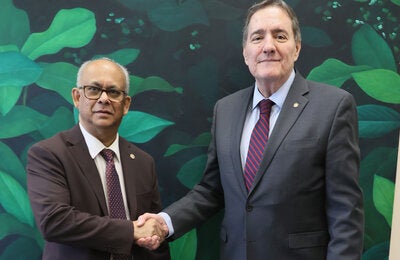
PAHO and the Center for Global Development (CGD) co-hosted a webinar to launch the Strategic Fund’s 2020 Annual Report, bringing together diverse experts and public health leaders to shine a light on opportunities for pooled procurement mechanisms to support both priority health programs and emergency response.
Washington, DC, July 13, 2021 (PAHO)– “Coordination and distribution of essential medicines and supplies is paramount during health emergencies. However, [during COVID-19] a combination of supply chain disruptions, rising healthcare costs, lack of financial support, and inadequate quality control made managing and delivering lifesaving resources increasingly difficult,” said Jarbas Barbosa, Assistant Director of PAHO, during the opening remarks of the PAHO-CGD webinar “Pooled Procurement and Essential Medicines: What Can We Learn from the PAHO Strategic Fund Experience?” on July 13.
The event brought together diverse experts, from PAHO officials, representatives from Ministries of Health, and thought leaders in medicines policy, health systems strengthening, and healthcare supply chains. The panelists reflected and deliberated on the importance of having multi-laterally mechanisms like the PAHO Strategic Fund which helped Member States ensure the continuous access and availability of essential medicines and products.
Marking the twentieth anniversary of the PAHO Strategic Fund, the launch of the program’s 2020 Annual Report also covered the exceptional year due to the COVID-19 pandemic. The milestone year was unprecedented in many ways, including heightened challenges in ensuring accessible health technologies and opportunities for strengthened technical cooperation and multisectoral collaboration.
“The Strategic Fund had demonstrated the importance of close collaboration and partnership with Member States -- in the spirit of solidarity and Pan-Americanism –to help achieve health for all,” said Barbosa.
During the discussion, special attention was placed on the specific solutions possible by pooled procurement mechanisms, like the PAHO Strategic Fund, to support the PAHO Member States rapidly responding to the pandemic while maintaining their ongoing commitments to priority health programs.
Alexandra Hidalgo, Vice Minister of Bolivia’s Ministry of Health, noted the critical role of expanded primary healthcare to meet the needs of the country’s citizens. Julio Garay, Chief of the National Tuberculosis Program in El Salvador, hailed the Strategic Fund’s advantages in terms of cost and quality of health products as well as its robust communication and agility in rapidly supporting response. Socorro Gross-Galiano, PAHO/WHO Representative in Brazil, praised the Strategic Fund as an important mechanism to bring forth innovation.
“Our people deserve to have quality, safe, and effective medicines,” said Analía Porrás, Unit Chief of PAHO Medicines and Health Technologies, and explained how vital pooled procurement mechanisms are to meeting this goal.
Claudia Vaca, Associate Professor at the National University of Colombia, highlighted that addressing the lack of information in pricing and pharmaceutical markets, increasing the efficiency of national and local health departments, and adhering to the principles of collaboration and solidarity are key lessons offered by the PAHO Strategic Fund for other similar pooled procurement mechanisms.
Prashant Yadav, Senior Fellow at the Center for Global Development, called for pooled procurement mechanisms that are leveraged at the national and sub-national levels, as well as “a better model of information sharing with suppliers” that allows for improved tracking and forecasting of medicines and supplies at the community level.
Javier Guzman, Director of Global Health Policy at the Center of Global Development, emphasized the importance of political solidarity as a critical prerequisite for pooled procurement mechanisms.
In his closing remarks, Christopher Lim, Unit Chief of the PAHO Strategic Fund, summarized the panel discussion by urging technical partners and policymakers to strike an essential balance between efficiency and resilience in shaping sustainable and equitable health systems. “Today’s discussion is the first of many that will continue to glean salient lessons from the past two decades to improve PAHO’s ability to support Member States in the region,” Lim said, concluding that “we will not rest here – this is just the next step.”



